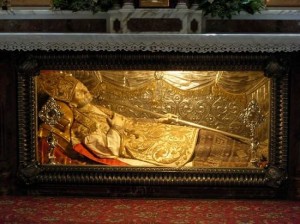 O God, who constantly raise up in your Church new examples of virtue, grant that we may follow so closely in the footsteps of the Bishop Saint Alphonsus in his zeal for souls as to attain the same rewards that are his in heaven.
O God, who constantly raise up in your Church new examples of virtue, grant that we may follow so closely in the footsteps of the Bishop Saint Alphonsus in his zeal for souls as to attain the same rewards that are his in heaven.
The following text is taken from a sermon by Saint Alphonsus Liguori (September 27, 1696 – August 1, 1787), bishop, founder of a religious order and a Doctor of the Church. You and I would do well to take stock of how much we really live a life of virtue and how much we are concerned with our final end, hopefully, heaven.
Saint Alphonsus:
All holiness and perfection of soul lies in our love for Jesus Christ our God, who is our Redeemer and our supreme good. It is part of the love of God to acquire and to nurture all the virtues which make a man perfect.
Has not God in fact won for himself a claim on all our love? From all eternity he has loved us. And it is in this vein that he speaks to us: “O man, consider carefully that I first loved you. You had not yet appeared in the light of day, nor did the world yet exist, but already I loved you. From all eternity I have loved you.”
Since God knew that man is enticed by favours, he wished to bind him to his love by means of his gifts: “I want to catch men with the snares, those chains of love in which they allow themselves to be entrapped, so that they will love me.” And all the gifts which he bestowed on man were given to this end. He gave him a soul, made in his likeness, and endowed with memory, intellect and will; he gave him a body equipped with the senses; it was for him that he created heaven and earth and such an abundance of things. He made all these things out of love for man, so that all creation might serve man, and man in turn might love God out of gratitude for so many gifts.
But he did not wish to give us only beautiful creatures; the truth is that to win for himself our love, he went so far as to bestow upon us the fullness of himself. The eternal Father went so far as to give us his only Son. When he saw that we were all dead through sin and deprived of his grace, what did he do? Compelled, as the Apostle says, by the superabundance of his love for us, he sent his beloved Son to make reparation for us and to call us back to a sinless life.
By giving us his Son, whom he did not spare precisely so that he might spare us, he bestowed on us at once every good: grace, love and heaven; for all these goods are certainly inferior to the Son: He who did not spare his own Son, but handed him over for all of us: how could he fail to give us along with his Son all good things?